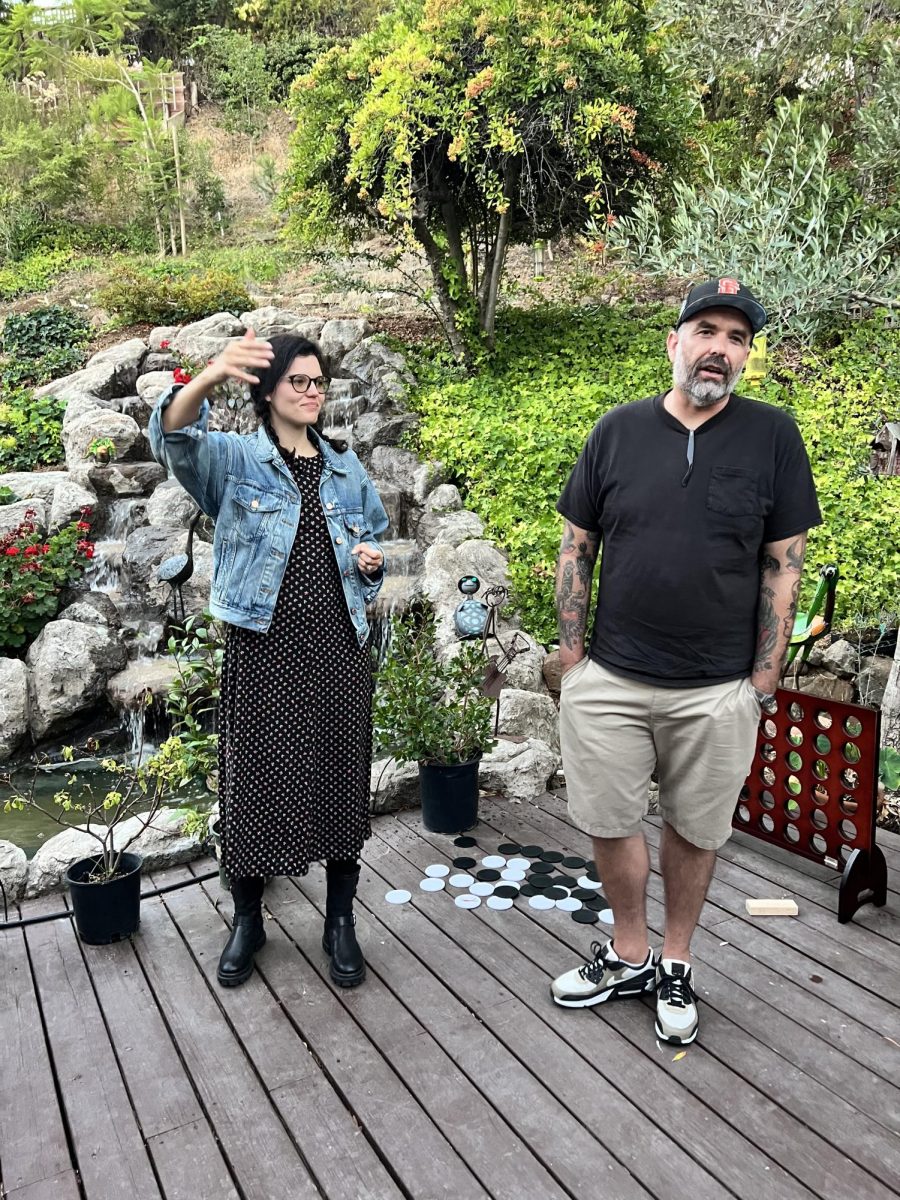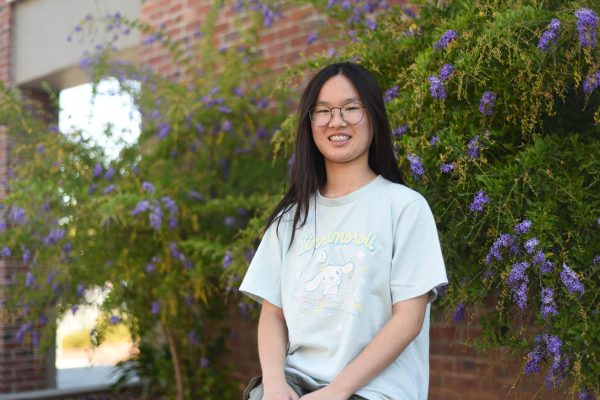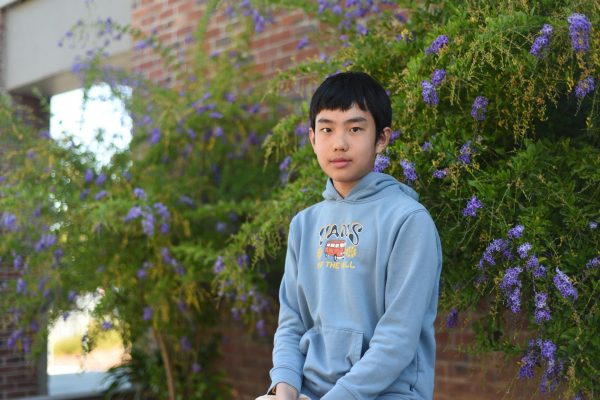With the noise of waves gently rolling onto the sandy shore and seagulls squawking in the distance, senior William Dahm and his older siblings stroll down the beach, catching up with each other along the way. It’s a bonding moment that’s hard to come by for Dahm, as his siblings, who are 11, 22 and 25 years older than him, have all moved out of the house. Due to the size of their age gap, Dahm’s two oldest siblings, his brothers, already lived separately from their parents by the time Dahm was born, leading him to experience more moments with his older sister.
“I see my sister most often because she grew up in the same household as me, whereas with my brothers, they were pretty much already adults when I was born, so they kind of have their own lives,” Dahm said. “I like going to the beach with my siblings, because when we’re walking, we can have more real conversations, as opposed to at family dinners where it’s a lot of small talk. When it’s just a few people, you can really get to know them, one on one.”
Freshman Melinda Zhao, whose two older brothers are 10 and 16 years older than her, has had a similar experience as Dahm. While her brothers played an important role in the early years of her life, even taking her to school in the mornings, Zhao’s brothers have now both moved out. This reduced amount of time spent together has led Zhao to feel more distant from her siblings.
“Most siblings live together, so you see them every day,” Zhao said. “I don’t see my siblings every day, so I think it does change the family dynamic. It feels a bit lonely in the house sometimes, especially when you know you have friends who have siblings that they can constantly speak to.”
Biology and Health teacher Pooya Hajjarian says some relationships are universal — among them are the tight-knit relationships between siblings. However, being the second youngest of five brothers, Hajjarian has noticed how different age gaps impact his individual relationships with his siblings.
“My younger brother and I have an 18 month age difference, so it’s almost like we’re twins,” Hajjarian said. “However, I think because there’s a 12 year age difference with my oldest brother, we don’t have as much in common, so it takes a little more effort to try to understand one another. It feels a little more like father and son than it does brother-like, to some degree.”
Similarly, Dahm acknowledges that the large age gap between him and his siblings leads to generational differences between them. However, he believes that these differences don’t impact their ability to relate to one another, as they are aware of the differences. For example, Dahm is familiar with popular bands that his siblings grew up with, while his siblings keep up with newer bands he listens to.
Hajjarian notes that along with generational differences, cultural differences also influence his relationship with his oldest brother. Having spent only 11 and a half years in Iran, Hajjarian’s experiences differ vastly from those of his oldest brother, who spent twice as long there. Certain aspects of Iranian culture, like the Farsi language, are more important and come more naturally to his brother than to Hajjarian, leading them to have different values. Despite their differences, Hajjarian describes his brothers as some of his best friends, emphasizing the importance of spending effort to bridge the distance in maturing relationships.

“As people get married and have their own lives and kids, it’s just naturally a lot easier to have distance between you and your siblings,” Hajjarian said. “If you put in the effort, you can continue to stay in touch and keep the relationship strong, but if you’re not putting in effort, it’s really easy to lose that relationship. I have this daily journal, and every day I want to put in the effort to connect with at least one of my brothers, so whether that’s a quick text to see how they’re doing or a phone call, that’s important to me.”
However, even though Zhao is able to reach her siblings whenever she wants over the phone, she highlights that the lack of face-to-face interactions limits the activities she can do with her brothers. While she used to frequently play video games with her brothers, when Zhao spends time with her siblings now, it is typically over a family meal. Zhao feels that the lack of other fun activities detracts from the traditional sibling experience.
“Since they’re much older than you, I feel like connecting with my siblings is harder than for other siblings, who play with each other or do something like that,” Zhao said. “I never really experienced that — my brothers were more like my babysitters, and they would have to look over me when I was younger. In that sense, they were like a secondary set of parents or guardians.”
Dahm also acknowledges that his older sister had at times played a parental role in his life when he was young. However, both Dahm and Zhao agree that, compared with their parents, it’s often easier to get advice from their older siblings.
“My parents are pretty old, so sometimes they’re a little out of touch with the way the world is today versus when they were growing up,” Dahm said. “It’s nice to go to my siblings for advice on things that they’ve already gone through, but it’s also close enough in time to where it’s something that our experiences are more similar than between me and my parents.”
Zhao adds that the cultural barriers between her and her parents make it more difficult to get advice from them compared to her siblings. Thus, she turns to her siblings for anything from help with her schoolwork to advice on living a balanced life.
“Most people here in the Bay Area have immigrant parents, but since you have siblings that grew up as Americans who happened to have Asian parents who are immigrants, I think it’s easier to get advice from them,” Zhao said. “Sure, my siblings and I might be 16 years apart, but still they went to the same high school as me, they all went to Monta Vista, they all went to Kennedy, and I think that sense that you can still relate to them.”
Having a similar mentorship dynamic with his oldest brother, Hajjarian highlights that such dynamics never change. Even as his relationships with his siblings have blossomed from never-ending fights to the strong bond they currently have, Hajjarian’s oldest brother still plays the same mentorship role for him and his brothers.
“I think there are certain dynamics that will always be in place, and my brother’s sense of obligation that he needs to make sure he’s there for us and help guide us in the right direction in life is one of them,” Hajjarian said. “He puts a lot of responsibility on himself to make sure that everybody is doing OK. But generally, my brothers and I always want to be there for one another, regardless of how old we are and where we are.”














